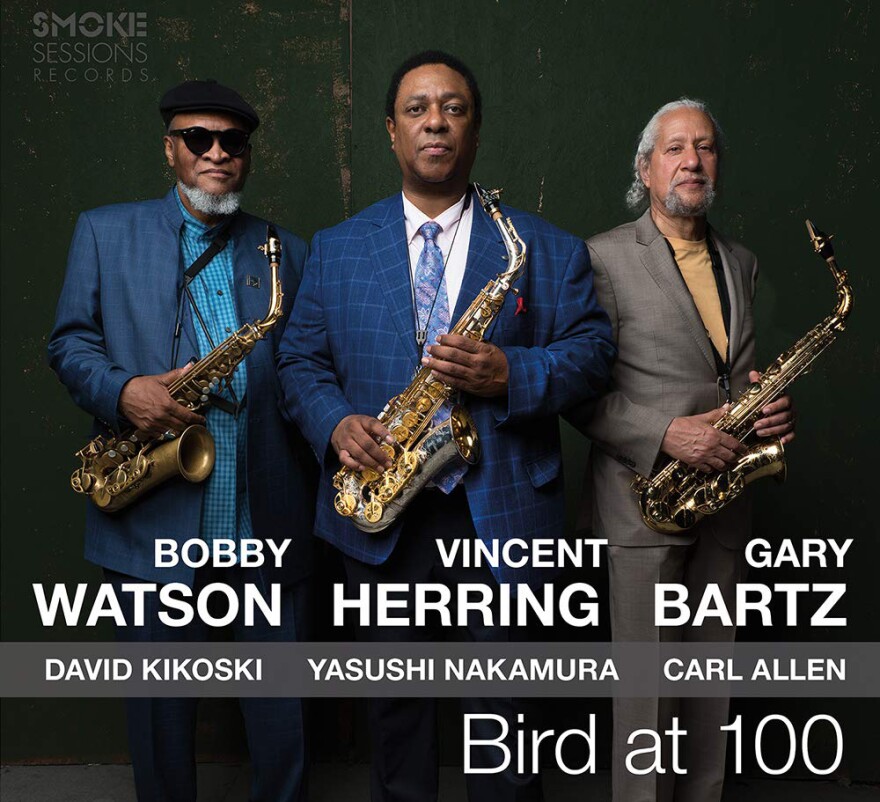August 31, 2020. Miles Davis once said, “You can tell the history of jazz in four words: Louis Armstrong. Charlie Parker.” August 29th, 2020 marked the 100th anniversary of the latter’s birth, and alto saxophonists Vincent Herring, Bobby Watson, and Gary Bartz got a head start on celebrating earlier this year with Bird at 100—a worthy tribute to the man of insatiable appetites who became a God-like figure to the Beat generation and redefined jazz to mean the highest form of musical improvisation.
After Parker’s death, despite all physical evidence to the contrary, the declaration Bird Lives! was everywhere—on biographies, tribute records, and graffitied sidewalks. It was a promise—as long as the music lived, and continued to evolve, with new musicians playing new harmonically complex lines over the same old tried-and-true chord changes, Bird would live forever.
-Sv--I-JFMY
And he has, thanks to stewards of the music, and champions of the alto saxophone, like Herring, Watson, and Bartz.
On Bird at 100, instead of presenting new arrangements of Bird’s compositions; instead of revisiting the standards Bird transformed from anodyne show tunes to the blazing bebop numbers that are still the proving ground for young instrumentalists; and instead of making a concept album comprising new compositions written with Charlie Parker’s legacy in mind…these three cats, all of whom have a slightly different relationship to Bird’s music, have decided to give us all three.
A take on Parker’s impossibly named “Klactoveedsedsteene” starts off this live set, which the three altos, backed by an A-list rhythm section, recorded live at Smoke over three nights in the dog days of last summer. The recondite title of the tune, which Bird recorded in ’47 with Miles and Max Roach, is said to be a made-up, German-sounding word that Parker happened to like the sound of.
If the corporeal Bird were around today, he might similarly enjoy the sound issuing here from these three horns.
They open with three rounds of the tune’s main theme, played in sharply arranged three-part harmonies, before allowing each altoist plenty of time out front—first Herring, then Watson, then Bartz. Each run lines that are complex yet melodic, played at tempo but squarely within the changes, never losing track of space or time, which, no doubt, pleases drummer Carl Allen. He wouldn’t want to have to pull a Jo Jones and hurl a cymbal at anyone’s feet.
Next is “Bird’s Up,” a tune written by Bobby Watson that’s actually a contrafact of Bird’s “Confirmation,” meaning Watson’s created a new melody and laid it over-top “Confirmation’s” basic chord progressions, a technique indispensable to jazz musicians that Parker didn’t invent but did perfect. Each has their turn trading fours with rock-solid backstop Carl Allen before revisiting the tune’s main theme, which they bring back to Earth with triumphant playing in unison.
Though Bird was known for the velocity and complexity of his passages, few played ballads as well or communicated through them such feeling; here, each alto-man gets a Bird-inspired ballad all to himself.
Herring’s “Lover Man” is clean and smooth and contains plenty of athleticism, though it lacks the raw emotionality of Bird’s infamous 1946 take for Dial Records—you know the one; there’s no “Lover Man” that can compare to that one. Mingus agreed, even if during his life Bird never did.
DHaPfQTh5a0
In this version, a lightning quick highlight comes toward the very end. With the rhythm section laying out, Herring furtively and cleverly quotes “Ornithology” before inviting Dave Kikoski (piano), Yasushi Nakamura (bass), and Allen back in to take things home.
Meanwhile, Watson’s ballad-turn on “These Foolish Things” offers a master class in phrasing and articulation, and Kikoski is given plenty of room to stretch out a big, warm blanket of a solo. Bartz, the elder statesman of this group, who thinks of Bird as “the modern day Bach,” is the last of the three to deliver his feature ballad, a meandering, labyrinthine “April in Paris” reminiscent of Bird’s take from Charlie Parker with Strings.
Other cuts worth mentioning include a take on Jackie McLean’s hard driving “Bird Lives,” and the Herring-penned “Folklore,” a tight orchestration that sounds great played by three altos.
“The Hymn,” a Parker composition, showcases Nakamura to an extent not seen anywhere else on the album; it’s easy to overlook, but worth sticking around for.
The closer is an 11-minute take on one of the most celebrated and anthem-like of Parker’s originals, “Yardbird Suite.” The introductory rendering of the familiar theme strikes me as slightly anti-septic, perhaps the cost of playing too precisely. In that way, it sounds like an advanced saxophone étude, as opposed to what we expect “Yardbird Suite” to be, which is, at the very least, a little less stiff sounding.
Not to fear, the fellas find their groove here soon enough; it’s really only the first minute or two that could stand to un-tuck its shirt and maybe tousle its own hair a little. Overall, Bird at 100 is a worthy tribute to a jazz legend.


